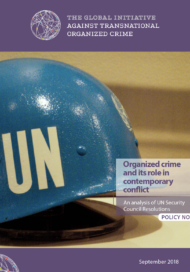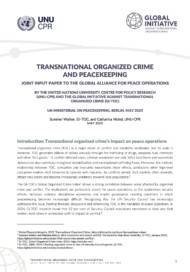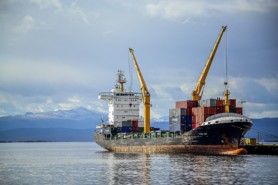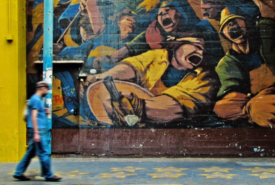Posted on 12 Jun 2020
Two key areas that have been impacted by – and have impacted – the context of COVID-19 are environmental crime and the question of decarceration. The postponed UN Congress on Crime Prevention and Criminal Justice would be well advised to include these in its declaration, as well as other transnational organized-crime challenges presented by the pandemic.
The Global Initiative recently published two policy briefs related to COVID-19, the UN and organized crime: COVID-19 and Crime and Detour on the Road to Kyoto. These papers examine the need for the international community to formulate responses in light of the context that the pandemic has created, and to encourage better coordination across UN agencies and development-centred approaches to tackling organized crime.
The Fourteenth UN Congress on Crime Prevention and Criminal Justice (the Crime Congress) was scheduled for 20–27 April 2020 in Kyoto, Japan. In March, the government of Japan and the UN Office on Drugs and Crime (UNODC) announced that the congress would be postponed owing to the pandemic. The Crime Congress is an opportunity for progress to be made on organized crime at the international level, especially given that its declaration sets out member states’ priorities on a wide range of crime prevention and criminal-justice issues over the next five years. Negotiations on the declaration for the congress had begun before the pandemic, and are continuing in preparation for the congress to take place at an undetermined date. Although these negotiations do not appear to have yet taken the pandemic into account, it is imperative that governments do not ignore the significant challenges that are underscored by the pandemic.
Here we identify one crime-related and one criminal-justice issue that show how COVID-19 could prompt a rethink on issues that are on the Crime Congress agenda. These two areas (illicit trade in wildlife and decarceration) reflect the interconnected nature of crime, criminal justice and public health, and hence reinforce the need to link the UN crime agenda and Agenda 2030.
Crime: Illicit wildlife trade
The possible role of the pangolin as an intermediary carrier of the coronavirus into a wet market in China has propelled the illicit wildlife trade (IWT) to the top of the international agenda. Although the debate around the origins of the virus continues, issues concerning wildlife trade and how viruses can be transmitted from animal to human are now at least more widely understood by the general public.
In April 2020, the Executive Director of the UNODC, Ghada Waly, highlighted the potential role of the pangolin as a COVID-19 intermediary, using it as an opportunity to draw the links between IWT, environmental destruction and the damage these cause to public health. Calls for wider bans on wildlife markets and associated practices are being debated within the environmental and conservation policy community. Progress on expanding the necessary legal instruments, however, has been slow, and the international community still relies on the trade-based CITES (the Convention on International Trade in Endangered Species of Wild Fauna and Flora).
The Doha Declaration of 2015 covers these issues – albeit only fleetingly. It does, however, recognize the links between wildlife crimes and other forms of transnational organized crime. And, recognizing the widespread links between IWT and corruption, several Western member states have tried to integrate wildlife crime into the work of the UN Convention Against Corruption (UNCAC) Conference of States Parties, but this move has been strongly resisted by other states, including Brazil and China. There are more recent sources that can be used as delegations negotiate, including, most recently, CCPCJ resolution 28/3 (‘Strengthening regional and international cooperation in crime prevention and criminal justice responses to illicit trafficking in wildlife’). This resolution refers to ‘the vast environmental and criminal impact of illicit trafficking in wildlife’, and notes the London Declaration on IWT of 2018, which was very clear on the impacts of IWT and the need to treat it as a serious crime, including through the use of the UN Convention against Transnational Organized Crime.
Before the Crime Congress was postponed indefinitely, environmental crime was a bone of contention in the negotiations because of disagreements over definitions and differing understandings of the issues being discussed. These disagreements are sure to continue, but will be framed in a context that now links IWT and COVID-19, recognizing that IWT is one component of environmental crime.
As countries continue to spar about who was responsible for the pandemic, resolving disagreements around IWT could prove tricky, yet there is some consensus to build on.
To forge that consensus and better reflect the situation and relevance of IWT and related crimes in a post-pandemic world, the Crime Congress would do well to take inspiration from Waly’s words in its recent publication on pangolin trafficking, in particular the way in which she highlights the cross-cutting threat that IWT poses. The Declaration of the congress also needs to recognize the links between these crimes and other forms of transnational organized crime, and address development issues as well as law-enforcement and criminal justice.
A proposed paragraph on environmental crimes and IWT in the declaration could therefore be phrased as follows:
Recognizing the role of the illegal wildlife trade and related criminal activity in facilitating the transmission of zoonotic diseases, and therefore recognizing that IWT and environmental crimes are a threat not only to the environment and biodiversity, but also to human health, economic development and security; and recognizing the transnational nature of IWT, and therefore the links between IWT and other forms of TOC, illicit financial flows and corruption, we commit to making full use of the existing range of relevant international legal frameworks and sanctions regimes to bring perpetrators to justice through the criminal-justice system. We also commit to addressing the socio-economic issues and cultural practices that drive and enable TOC related to IWT, including through a development-centred approach to achieving peaceful societies and protecting the environment, as envisioned in Agenda 2030.
Criminal justice: Decarceration as a holistic approach
The pandemic has refocused attention on a long-recognized problem. At the last Crime Congress in 2015, governments recognized prison overcrowding as an epidemic in its own right. More recently, as COVID-19 spread, prisons and migrant detention centres became high-risk locations for contagion, shining a light on the health-and-safety risks inherent in prisons during the pandemic. Pre-trial detention, a deference to imprisonment over non-custodial measures for a host of issues, and punitive sentencing practices all contribute to increasing prison populations. Interestingly, early on in the pandemic, some of the more hard-line countries on criminal-justice matters, such as Iran and Indonesia, released more detainees than European countries or more liberal US states. In mid-May, a joint-statement was released on COVID-19 in prisons and closed settings by the UNODC, World Health Organization, UNAIDS, and the Office of the UN High Commissioner for Human Rights, calling on states to reduce overcrowding. Prison overcrowding has once again assumed a high level of urgency and could resurface in Crime Congress debates.
Governments should use this opportunity to advance policy on decarceration and tie it to UN discussions on reducing the use of detention in a more holistic manner. UN agencies have increasingly recognized that reducing prison populations means reducing an over-reliance on incarceration as a policy response. The UN Network on Migration is calling for a moratorium on the use of immigration detention, offering guidance to states on the topic and COVID-19. In 2019, the UN Chief Executive Board issued a UN System Common Position, which calls on states to consider the decriminalization of drug use to address prison overcrowding. Proportionate sentencing and alternatives to incarceration were key topics in the 2016 General Assembly outcome document on the world drug problem. A lot of the language encouraging decarceration and reintegration already exists in policy documents. In the past, key guiding frameworks on the use of prisons have been adopted alongside the Crime Congress, including the 2015 UN Standard Minimum Rules for the Treatment of Prisoners and the 2010 UN Rules for the Treatment of Women Prisoners and Non-Custodial Measures for Women Offenders.
This Crime Congress should address decarceration, including policy responses that fuel detention, and could set in motion a policy process to develop minimum standards or guidelines towards these objectives. Potential language in the declaration could be couched as follows:
Recognizing the health, economic and social costs of prison overcrowding and the over-reliance on carceral measures, governments commit to working towards decarceration by exploring measures to reduce the reliance on detention settings, including by reviewing options for decriminalization of certain offences; reducing pre-trial detention; utilizing alternatives to incarceration; and promoting proportionate sentencing, early release, social reintegration, restorative justice and reforming parole monitoring.
As we have documented in our policy briefs, the multilateral system at large is struggling to respond to the challenges posed, and the organized crime-related development needs that have been brought to the fore, by the pandemic. By its nature, the UN needs to build consensus and bring the international community with it, meaning it can be slower to respond to issues than single governments or independent NGOs. This is especially the case in those parts of the UN that rely on consensus-based decision making (including the governing bodies of the UNODC). The Crime Congress is not even a decision-making body, which constrains its ability to make tangible change speedily. However, what it can do is use its political voice, through its outcome declaration, to seize the opportunities for change that have been presented in recent times.
The zeitgeist demands urgent responses to the rapidly evolving development and security needs exposed by the pandemic. Reverting to the usual mix of tools and responses as the multilateral system tries to continue its work will not achieve the results and show the leadership that is needed. The multilateral diplomatic calendar has become built on recurring resolutions and declarations in various settings, including those covering organized-crime issues. In these settings, progress is slow and incremental. In this article, we have only highlighted two potential issues on which progress could be made. By moving ahead of the consensus and showing that the international community understands how to formulate, and indeed is committed to implementing, a more effective response, the Crime Congress can act as a catalyst for real action.



